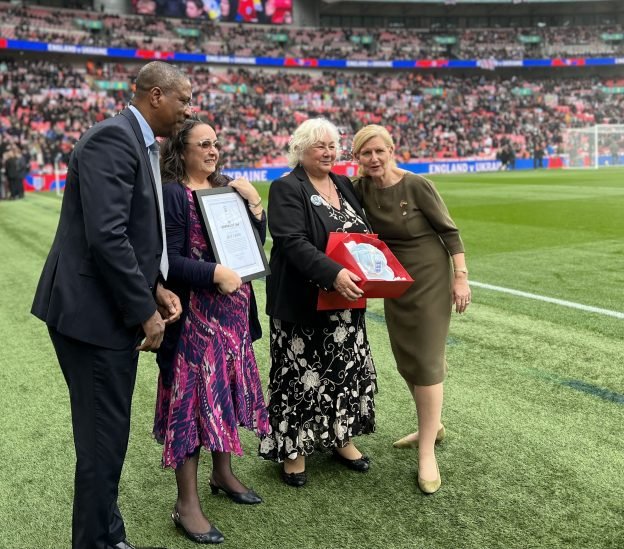The Football Association has awarded Jack Leslie a posthumous honorary England cap in recognition of the call up he received in 1925, only for his name to be removed from the team sheet due to the colour of his skin shortly after. The FA offered no explanation at the time for why the trailblazing forward was taken out of the team, instead Jack was wrongly deprived of the opportunity to play for his country at the highest level.
The awarding of the cap (by current FA chair Debbie Hewitt) was overdue but nonetheless very welcome, and was applauded by a sold out Wembley stadium (prior to the European qualifying game against Ukraine on 26th March)
Many important football figures were present to show their support, and I set out to ask them what was the significance of this symbolic gesture by the FA.

Viv Anderson, accompanied by members of Jack’s family, was on the pitch prior to England’s 2-0 victory over Ukraine. Having learned of Jack’s story, Viv Anderson MBE described himself as ‘honoured and privileged’ to present the cap to Jack’s granddaughters Lyn and Gill. ‘I didn’t know about Jack Leslie prior to lockdown, and it’s important that people know about the history of Jack Leslie and others, like Arthur Wharton’. As a footballing pioneer himself, Viv appreciated the significance of Jack’s story, emphasising the importance of ‘making his history known’. Viv represented England himself, making his debut in 1978- he was the first black footballer to win a full England cap.

Former West Ham and Chelsea striker, and supporter of the campaign, Carlton Cole was also in attendance. As a former England international, he touched on what it felt like to put on the shirt, stating ‘When you get called up for your country it’s an overwhelming feeling, an unbelievable feeling of completion to have made it to the top. And when you see someone like Jack Leslie told that he can’t reach that top tier, it makes you wonder what you’re in football for’. The ’unbelievable feeling of completion’ that Cole mentioned was an achievement most players dreamt of, yet Jack’s ceiling of career success was limited by discriminatory forces beyond his control.

Paul Elliott, former chair of the F.A inclusion advisory board (IAB) was also present and spoke before the game, stating ‘In the modern game, diversity, equality and inclusion must be the golden thread that connects people, and not just in football but wider society as well’. ‘In the case of Jack it’s also about long overdue recognition’ he added, and went on to say ‘as much as we must focus on the present and future, today is about celebrating the past’.

Jack Leslie’s compelling story was forgotten, and only now is he receiving the ‘long overdue recognition’ that Paul Elliott described, thanks to the work of the Jack Leslie Campaign and Jack’s family, who will continue with legacy work following the unveiling of Jack’s statue outside Plymouth Argyle’s Home Park. The battle for equality of opportunity is still ongoing, which is why it is crucial that these stories are brought to attention and that these pieces of history are celebrated.
Adam Smith 29/03/2023



